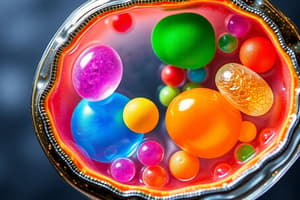Podcast
Questions and Answers
What is the primary component of carbohydrates?
What is the primary component of carbohydrates?
- Carbon (correct)
- Oxygen (correct)
- Hydrogen (correct)
- All of the above
What do carbohydrates polymerize to form?
What do carbohydrates polymerize to form?
Polysaccharides
What is cellulose primarily used for in plants?
What is cellulose primarily used for in plants?
Structure
What is chitin used for?
What is chitin used for?
What is cholesterol a precursor for?
What is cholesterol a precursor for?
What does DNA stand for?
What does DNA stand for?
What is the structure of a nucleotide composed of?
What is the structure of a nucleotide composed of?
What is the primary function of lipoproteins?
What is the primary function of lipoproteins?
Which of the following is an example of a polysaccharide?
Which of the following is an example of a polysaccharide?
Lipids are soluble in water.
Lipids are soluble in water.
What is the main dietary source of energy that lipids provide?
What is the main dietary source of energy that lipids provide?
What does a saturated fatty acid contain?
What does a saturated fatty acid contain?
What is the primary structure of a protein?
What is the primary structure of a protein?
What is a triglyceride composed of?
What is a triglyceride composed of?
What defines organic chemistry?
What defines organic chemistry?
Which of these is a function of glycoproteins?
Which of these is a function of glycoproteins?
Flashcards are hidden until you start studying
Study Notes
Carbohydrates
- Organic molecules composed of carbon, hydrogen, and oxygen; often in a 2:1 ratio of hydrogen to oxygen.
- Monosaccharides serve as building blocks for polysaccharides like starch and cellulose.
- Cellulose, dense and rigid, is the primary component of plant cell walls and acts as insoluble dietary fiber in mammals.
Lipids
- Lipids are insoluble in water and include triglycerides, cholesterol, and phospholipids.
- Fatty acids can be saturated (no double bonds) or unsaturated (one or more double bonds).
- Phospholipids have a hydrophilic phosphate group and hydrophobic fatty acid tails, essential for forming cell membranes.
Proteins
- Composed of amino acids in long polypeptide chains which fold into specific shapes determined by their primary structure.
- Proteins can have primary, secondary, tertiary, and quaternary structures that dictate their function and interactions.
- Enzymes, structural proteins, and hormones are variations of proteins with distinct roles.
Nucleic Acids
- DNA is the primary molecule for storing genetic information, structured as a double helix of nucleotides.
- RNA is crucial for protein synthesis and includes varieties like mRNA, tRNA, and rRNA.
Functional Groups
- Functional groups are specific atoms or groups of atoms that impart distinct properties to carbon-based molecules, influencing reactivity and interactions.
Additional Molecules
- Glycoproteins, a combination of carbohydrates and proteins, play significant roles in cell signaling and hormone function.
- Glycogen serves as a storage form of carbohydrates in animals, while starch fulfills the same role in plants.
Chemistry Context
- Organic chemistry focuses on carbon-containing compounds central to biological processes and molecular structure.
- Monomers are small molecules that join to form larger polymers, a fundamental concept in biochemistry.
Studying That Suits You
Use AI to generate personalized quizzes and flashcards to suit your learning preferences.




